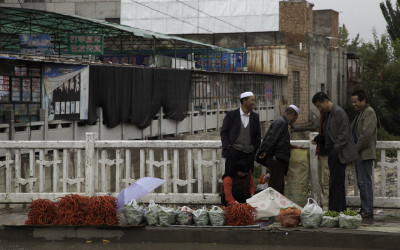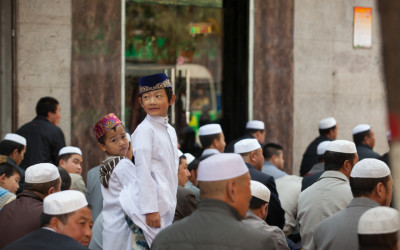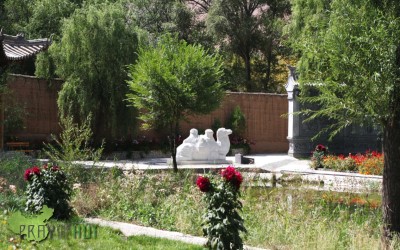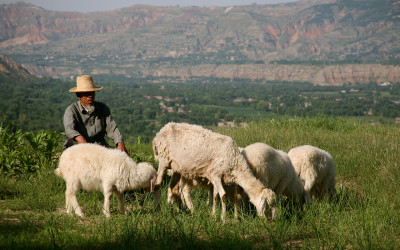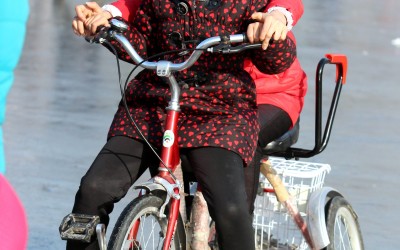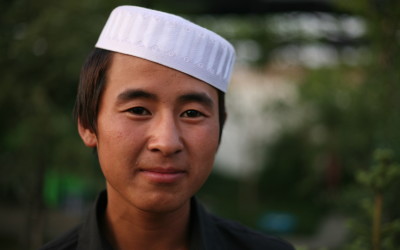The Salar
Continue steadfastly in prayer, being watchful in it with thanksgiving. At the same time, pray also for us, that God may open to us a door for the word, to declare the mystery of Christ, on account of which I am in prison—that I may make it clear, which is how I ought to speak.
Colossians 4:2-3
The Basics:
The Salar people migrated from the Samarkand region of Central Asia many centuries ago. According to oral tradition their forefathers bound a copy of the Koran to the head of a camel and followed it until it stopped at a waterfall and turned to stone in their present home of Qinghai province in Northwest China. Today two-thirds of the 120,000 Salar people still live in this small area of Xunhua County, Qinghai province, far away from the Uzbeks and Uighurs and other people groups with similar languages and cultures.
Their Beliefs:
Ninety Nine percent (99%) of the Salar people are Sunni Muslim and follow the five pillars of Islam: Witness, Prayer, Alms, Fasting, and Pilgrimage. They believe that there is no other God but Allah and hold dearly to the teachings set forth in the Koran by the prophet Muhammad. In the early 80’s there was in excess of 74 mosques in Xunhua County and that number would be considerably higher today. Life in each Salar community is centered around the local mosque and follows the instructions of the ahong, who is the religious leader and teacher in the mosque and community.
Their Language:
The Salar people have their own unwritten language. It is closely related to Uighur and Uzbek and typically spoken only in Salar homes and businesses. While the Salar language is unwritten, there is a growing movement to develop a written script and educate the younger generations so that their unique language and culture can be passed on. Approximately 80% of the Salar speak and understand the local dialect of Mandarin Chinese, while a significant percentage are able to speak Amdo Tibetan as a result of living and working among the Han Chinese and Tibetans for many years.
Their Livelihood:
The people are still predominantly agricultural focused, but many are also involved in the restaurant and transportation industries. Overall the economy in Xunhua has improved dramatically in the past decade, allowing many Salar to purchase homes and send their children to college for the first time. At the same time, there has been a renewed dedication to their Islamic beliefs and practice. Islam is no small part of their everyday lives.
The Situation:
Historically the Salar people have been labeled as troublemakers by the Chinese because of their involvement in numerous Muslim uprisings. They are a proud people – proud of this history, proud of their culture and language, and proud to be Muslims. In 1933 a young American family had a home in Xunhua County where they ministered to the Salar people. They opened a small chapel in the main Salar town and preached the Gospel, but with no success among the Muslim peoples – only the Chinese. In the 80-odd years since then, little has changed in the spiritual situation of the Salar people. While Chinese people are coming to Christ by the thousands, the Salar are still clinging to their Muslim heritage and beliefs, which are the only ones that they have ever known. But praise God that in the past few years the first few Salar people have come to faith in Christ Jesus and that more workers are coming to work in the harvest every month.
Ramadan 2024 Week 2 – Pray for the Salar of Qinghai
In this year’s Ramadan 30 Days of Prayer, we are focusing on four Chinese Muslim population segments. Download the 2024 Ramadan prayer guide here. This post provides more information about the Salar of Qinghai and specific prayer requests. Current Situation: ...
Eid al-Adha – The Festival of the Sacrifice
Hours before sunrise Mr. Ma, his father, grandfather, and 4-year-old son, Ibrahim, all rise and get dressed. Winter has almost arrived so they pull on their warmest long underwear before slipping into their finest clothes. Mr. Ma slips on black dress pants, a new white shirt and a nice grey sports coat. His son has received new clothes for this special day. He has a new white outfit that resembles traditional Muslim clothing with a colorful prayer cap (skull cap). The Ma men leave their mud brick home and walk down to the local village mosque where they find a tour bus waiting.
Day Five: The Salar People
In the Eleventh Century, two brothers led a group of Salar people from the Oghuz Turks tribe, fleeing from persecution in their hometown in Samarkand, which is located in today’s Uzbekistan. As they searched the desert for a new place to settle, the group suffered great hardships, but they all believed Allah would guide them to their final destination; these people were all Muslims.
Learning about Islam while driving through countryside
We were driving through the countryside with a Salar woman and her 7-year-old daughter to visit her family in her hometown. Along the way we passed through small villages and found it fascinating that they alternated between Muslim villages and Tibetan villages. The Tibetan villages were obvious with their brightly colored prayer flags flapping in the wind, while in the Muslim villages the minaret could often be seen from the main highway.
The Challenges Shifa Faces Being Born a Girl with a Genetic Disability
Shifa is the spunkiest six-year-old you would ever meet, but she was born with two strikes against her. First, she was born a girl. This means she cannot carry on the family name and so she is not as valuable as a boy. Second, she was born with a genetic disorder which requires constant medical care.
Xiao Ma’s Desire to Learn More About Jesus
All my life I have never considered there was another option besides being Muslim. My dad is Salar. My mom is Hui. As far as Salar and Hui people are concerned, Islam is the only faith. To be Hui or Salar is to be Muslim. Growing up, I learned how to worship at the mosque and follow many rituals. However, there is much about Islam that I did not learn.
Prayer for the Salar
- For Chinese Christians to go and live and minister to the Salar while exhibiting an attitude of sacrifice and service.
- Pray that the prejudice and mistrust that hinders this from happening will be dissolved.
- For the first group of Salar Christians – that they would grow into mature disciples who are bold in their faith and committed to building the church.
- For the preparation of new tools and strategies to reach the Salar with the gospel.

